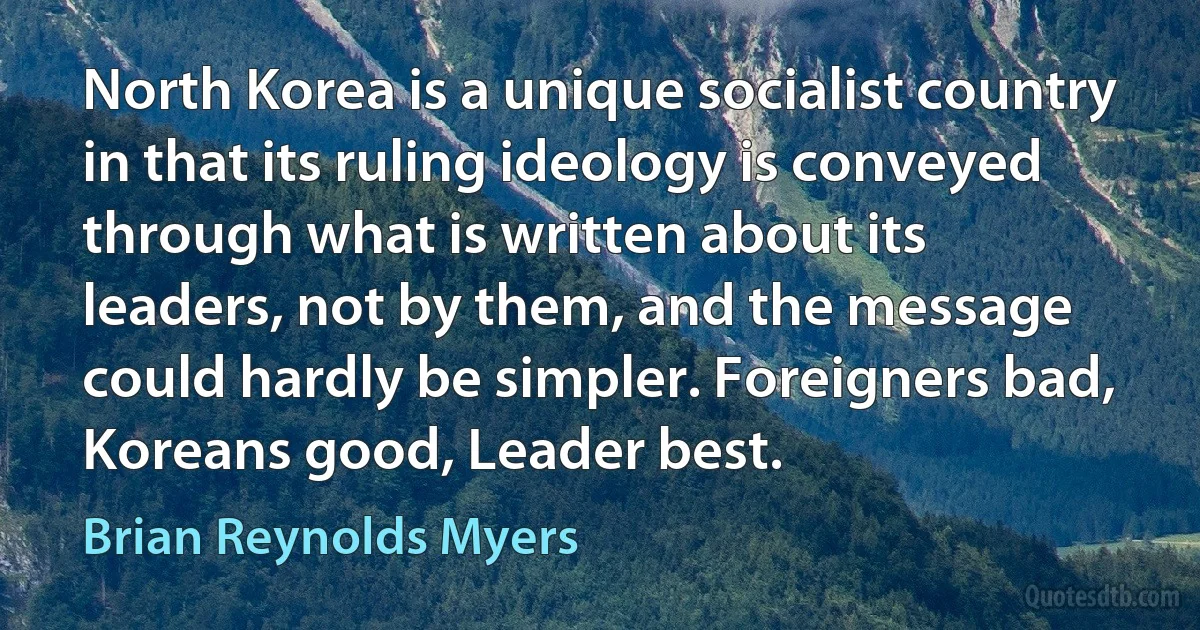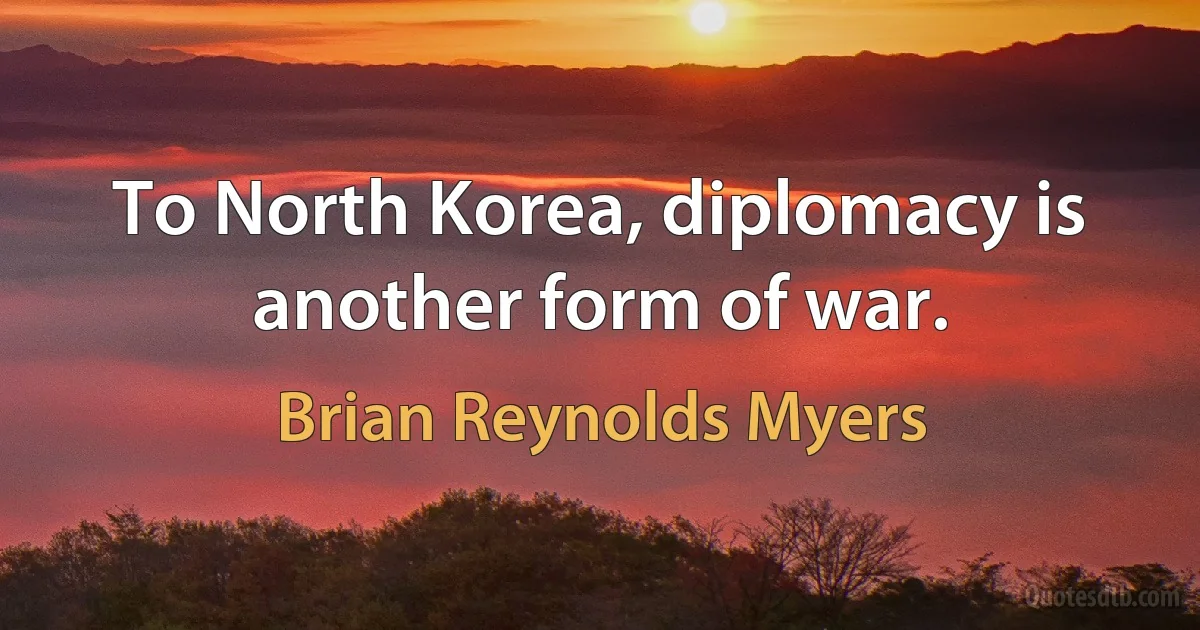Korea Quotes - page 10
The U. S. was never stronger, North Korea never weaker than in 1994, yet even then the fear of an artillery attack on Seoul prevented an air-strike on Yongbyeon. You can put it another way and say that the very success of the nuclear program, the fact that it has gone this far, proves that it was never necessary for North Korea's security in the first place.

Brian Reynolds Myers
[I]f we're going to jeer at North Korea for being a de facto monarchy, we must also acknowledge the main advantage of such a system: no divisive squabbling over who has the right to rule. On my book tour for "The Cleanest Race” I used the example of my British mother: a firm supporter of the monarchy with different estimations of the various royals. She doesn't like the idea of Charles becoming king, but accepts that it will and must happen.

Brian Reynolds Myers
Many intellectuals here [in South Korea] admire the North for standing up to the world. It's a right-wing sort of admiration, really, for a resolute state that does what it says. More common than admiration are feelings of shared ethnic identity with the North. We are perhaps too blinkered by our own globalism to understand how natural they are.

Brian Reynolds Myers
I have tried to draw attention to South Korea's dangerous state-loyalty deficit, by which I mean citizens' lack of a sense of identification with their republic. In doing so I have noted the obvious parallels with South Vietnam, another state fatally weakened by nationalism. On this point too, I seem to be talking to the wall. Even Americans interested in the nuclear crisis feel no need to learn about party politics in South Korea. It's a thriving, prosperous democracy, and that's all that matters.

Brian Reynolds Myers
A major problem is the characterization of the government in Seoul as liberal, as if it were no less committed to constitutional values and opposed to totalitarianism than the West German social democrats were in the Cold War. This makes Westerners think, "North Korea can't take over the South without a war, but it knows it can't win one, therefore it must now be arming only to protect itself."

Brian Reynolds Myers
Whatever "Cold War system" there might once have been here is already defunct. There was never such a system in the minds of the opposed leaders, despite the peninsula's tragic importance to Moscow and Washington. It might have been better if there had been. I'm not being flippant. Germans in East and West benefited from how each system tried to prove itself more compassionate and democratic, more conducive to its citizens' realization of their potential than the other. The relevant standards could hardly have been more different, but still. In contrast North and South Korea slid quickly into mutual nationalist recrimination, with each side accusing the other of subservience to a foreign power. This (not the over-weighted fact that Ossis and Wessis never clashed on the battlefield) is the main reason Bonn and East Berlin were able to maintain a coldly civil working relationship, routinizing mail service, family reunions, transit, etc, even at the height of Cold War tension.

Brian Reynolds Myers
[I]f Kim Il Sung had won the war, Korea today would not look like North Korea. I think it would still be a much less free and prosperous place than the South is now, but it would resemble China and Vietnam more than the North now does. Its system has been shaped by the need to distinguish itself, to seal itself off from the rival state, and to pursue nuclear armament.

Brian Reynolds Myers
The DPRK derives its legitimacy from the myth that the anti-Japanese hero Kim Il Sung was all right-thinking citizens' choice as the man to found and lead the new Korea after liberation in 1945... Until the mid-1960s the USSR was credited with defeating Japan, but since then propaganda has claimed that Kim and his guerillas freed the race on their own. That this is known to be untrue by those who lived through the time is of minor importance. The painful historical reality of mass collaboration (and the military insignificance of all armed Korean resistance to colonial rule) is precisely what made the Kim myth so attractive.

Brian Reynolds Myers
[R]elative lack of popularity is not as important as the lack of popularity of a president in South Korea, where there is no bedrock state support to keep people patriotic even when they dislike a leader. But we Americans are more like the North Koreans in that regard. Does our patriotism rise and fall depending on who is in the White House? If we don't like a president, do we start finding America's enemies more likeable? No. We should therefore not assume that Kim Jong Un's relative lack of stature means that support for the state is weakening.

Brian Reynolds Myers
Researchers of the peninsula will get nowhere unless they take a break from their quantifying now and then, and enter into an imaginative sympathy with Korean nationalism, the way any sensible literary scholar assumes a Christian frame of mind when reading Bunyan or Blake. Having done that one begins to understand why the North appeals strongly to an influential minority in the South. They don't want to live up there anymore than a moderate Muslim wants to live under the Taliban, but they see it as the purer Korea in many ways, the real deal.

Brian Reynolds Myers



